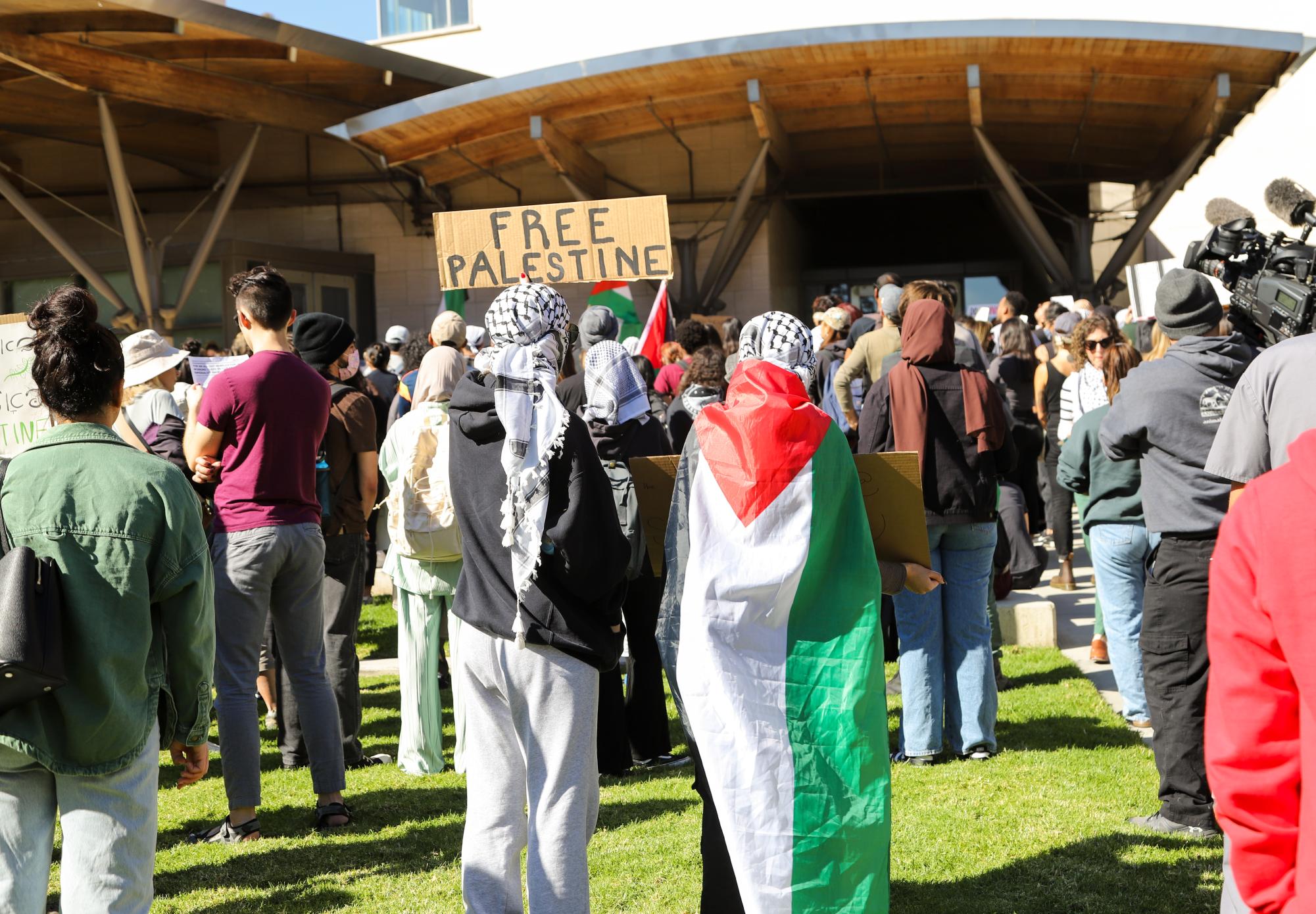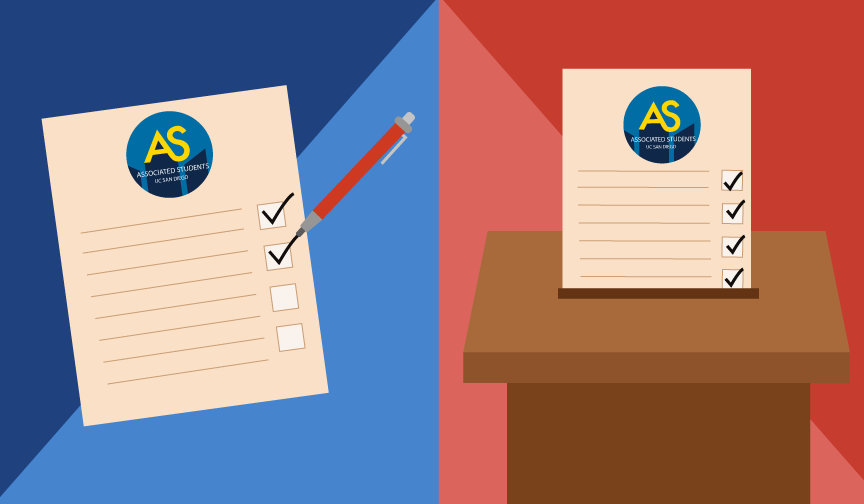Editor’s Note: This editorial is reflective of the editorial boards of The UCSD Guardian and The Triton. It does not necessarily speak for the entire staffs or the newspapers’ stance on the issue as organizations.
The editorial boards of The UCSD Guardian and The Triton once again call on Chancellor Pradeep Khosla and the UC San Diego administration to demand that the UC Board of Regents take action in response to the genocide the Israeli government is committing against the Palestinian people.
Since our original editorial was published on Nov. 29, conditions in the Gaza Strip have only worsened. As Palestinian civilians continue to urge for a ceasefire, it has only become more and more pertinent that the UC takes action. We demand the UC Board of Regents release a formal statement calling for a permanent ceasefire and acknowledgment of genocide, divest from corporations funding the IDF, and suspend study abroad programs in Israel.
In the 112 days since Oct. 7, there have been over 27,500 reported Palestinian deaths in the Gaza Strip, nearly double the death toll at the time of our original editorial. Women and children make up nearly two-thirds of this number. Even more have been raped, mutilated, and forcibly displaced, with the Israeli government justifying civilian Palestinian casualties as “collateral damage” in their pursuit of Hamas. Over half a million Gazan civilians have experienced “food insecurity equivalent to famine levels of starvation.” As the Israeli Defense Forces’ relentless campaign of airstrikes on hospitals, libraries, schools, and civilian homes continues, there are now no more fully functional hospitals in northern or southern Gaza. Of the 36 hospitals that once stood, only 14 remain even partially functional.
What is occurring in Gaza right now cannot be described as anything other than genocide. The systematic civilian-targeted violence carried out by the IDF “in response [to Hamas]” is not a “war” against terrorism, it is ethnic cleansing. In war, one side does not have the capability to entirely halt the basic functions of the other. The slew of humanitarian violations Israel has committed are those that only an apartheid state could be capable of, such as cutting off access to basic supplies like food, water, shelter, and Internet for the civilian population of Gaza and wiping out entire families from the Gaza civil registry.
The UC Regents have considerable influence as holders of the public trust of the largest public university system nationwide. The board’s actions have the power to apply massive pressure on the California state and federal governments to advocate for Palestine.
Khosla and the UC Regents have, as a whole, failed to adequately respond to and advocate for their students. UC Board of Regents Chair Richard Leib and UC President Drake’s Oct. 9 statement on Israel and Hamas has only exacerbated the dangers students face across UC campuses. Though the UC condemned Hamas’ actions on Oct. 7, they have been notably silent on the Israeli government’s ethnic cleansing of the Palestinian people. Their inaction enables the UC system to continue perpetuating selective empathy and contributing to the misinformation underscoring increased incidents of Islamophobia and antisemitism on our campus.
The UC Regents held their most recent meeting from Jan. 23-25, with item J3 on the agenda: a policy change that will prevent the expression of political speech on official UC channels of communication and administrative websites. This policy poses a massive threat to UC student and faculty groups advocating for Palestinian freedom and removes accountability measures for the Board of Regents. The board decided to revise the action item on Jan. 24 and officially tabled it on Jan. 25 until the next official Regents meeting on March 19-21.
With the re-release of this editorial, we intend to increase the urgency of our call on Chancellor Khosla and the UCSD administration to pressure the Board of UC Regents to stand with us on the side of compassion and humanity by releasing a statement calling for a permanent ceasefire in Gaza and condemning Israel’s genocide of Palestinians.
Additionally, to substantiate these symbolic statements, we reemphasize our recommendation for UCSD to lead the UC system in divesting from corporations funding the IDF, such as BlackRock. In 1984, student advocacy for the UC to divest from corporations supporting the apartheid government in South Africa was met with major success. The UC has a long history of divesting based on student concerns (2020 divestment from fossil fuels, 2017 divestments from Wells Fargo, 2015 divestments from private prisons), and we echo the calls of the UC students before us calling for this same divestment in 2015. By ending its affiliation with companies that support the Israeli government’s actions, the UC would effectively sanction the Israeli government.
Moreover, we encourage UCSD and other UC campuses to weaken relations with academic institutions in Israel until at least a permanent ceasefire is met. Study abroad programs are a form of public diplomacy that the UC must suspend in order to show our unwillingness to cooperate with a government committing ethnic cleansing.
Through partnerships with corporations that fund the IDF and our yearly study-abroad offerings to Israeli universities, the UC public college system has been used as the California government’s puppet of public diplomacy for strengthening U.S.-Israel relations. There has never been safety for Palestinian students in the UC, nor acknowledgment that these programs and investments go to funding the removal and extermination of their people from their homeland.
We are not alone in this call; alumni from the UC released a statement on Jan. 4 pledging to withhold donations until the UC Regents call for an immediate and permanent ceasefire and “divest from all enterprises of United States militarism and imperialism as well as companies profiting from Israel’s oppression of Palestinians” as outlined by UC Divest and the BDS movement. The statement has 1,237 signatories as of Jan. 27.
Furthermore, since our original editorial, UC Santa Barbara’s Daily Nexus, UC Santa Cruz’s City on a Hill Press, and UC Davis’s The California Aggie editorial boards have released their own editorials echoing our call for action.
Though a deal for a humanitarian pause passed in November, this temporary ceasefire provided the citizens of Gaza only the briefest respite from the IDF’s ethnic cleansing without enough time to meet the humanitarian aid needs of civilians. Since then, the Israeli government has only bolstered its war efforts, outright dismissing opportunities for de-escalation or deterrence.
On Jan. 21, the Israeli government declined the offer from Hamas to release all of the hostages in exchange for Israel’s withdrawal from Gaza. In response to the recent ICJ ruling ordering the Israeli government to prevent acts of genocide, Netanyahu rejected the decision and labeled the charges as “outrageous” and “discrimination.”
The original pause deal resulted in part from international pressure placed on the Israeli government. It has become increasingly clear that a permanent ceasefire will not be possible until there is overwhelming pressure from governments, companies, and institutions (like the UC) worldwide that hold social, political, and/or economic power.
The violence in Gaza is uniquely characterized and exacerbated by misinformation and ethnonationalist propaganda spread by Israel and U.S. leadership spanning more than the last 75 years. Journalists across the globe have been censored, fired, and killed for their coverage of this issue.
As of Jan. 27, there have been 83 reported deaths of journalists — 76 Palestinian, four Israeli, and three Lebanese — in Gaza who were covering this conflict. An additional 16 have been injured, three are missing, 25 have been detained, and even more have suffered “assaults, threats, cyberattacks, censorship, and killings of family members.” There have been documented cases of Israeli politicians calling for the “elimination” of journalists who have been covering the massacre in Gaza.
The deaths of journalists and the rampant spread of misinformation are fundamentally intertwined. We must acknowledge that much of how we got here is the result of the incorrect conflations of anti-Zionism with antisemitism, of all Palestinians with Hamas, of all Jewish people with being Zionists, and of all Muslims with terrorists. We see and understand how Jewish people in the diaspora are reeling from their own losses and generational trauma from the Holocaust, and how that elevates valid fears of antisemitic violence whenever Jewish issues are brought into public discourse. Hamas’s heinous actions on Oct. 7 and the increasing antisemitism since should not be justified or defended. That being said, “Never again” must mean never again to any group. The peaceful coexistence of Jewish and Muslim peoples in the Middle East existed long before the state of Israel and can continue with the right steps forward.
The truth of the conditions in Gaza is now being documented almost exclusively by students, young people, and the records left behind of now-dead journalists on social media platforms. Several of the most prominent sources for on-the-ground coverage in Gaza come from civilian youth. Every update posted online by Lama (9 years old), Bisan (25 years old), and Abod (18 years old) is another day we can breathe a sigh of relief that they are still alive.
As student journalists at UCSD, we have witnessed firsthand the toll this genocide has taken on the Palestinian and Muslim communities at our university, who have been cut off from their friends and families in Gaza. We have reported as candidly as we could, though many national news stations continue spewing misinformation. We cannot sit idly by as we see our journalist brothers and sisters in Palestine being targeted and killed for sharing the realities of the unending violence they face in Gaza.
The editorial boards of our newspapers are a diverse body of students. We come from a variety of religious and ethnic backgrounds. Many of us carry the generational trauma of colonization and oppression. We have spoken to Palestinian and Jewish students alike and held space for their pain on our pages. We see how Islamophobia and antisemitism have risen to record highs on college campuses and in day-to-day life. We recognize and validate the very legitimate fear that Palestinian, Muslim, Jewish, and Israeli folks are feeling.
We firmly believe that we are able to remain objective and reliable news sources while standing up for human rights. This editorial is reflective of our passion for justice and the desire for change we feel as student journalists. These dialogues and actions can and must be handled with nuance, accuracy, deliberation, and empathy. The UC Regents must take action. We must stand for what is right.
We call upon our fellow student journalists across the nation to join us in taking a stand.
Signed,
The Editorial Boards of The UCSD Guardian and The Triton







Tan Baguet • Mar 7, 2024 at 8:14 am
Sorry, they complain about genocide, but if you ask them what should be done with Israel, they’ll likely endorse a mass slaughter.
They also never condemn Hamas atrocities! Sexual violence is never a form of resistance.
Romo • Jan 31, 2024 at 1:46 am
Thank you for your efforts and I hope they do not go unnoticed!